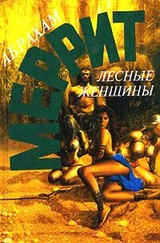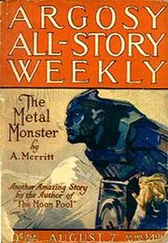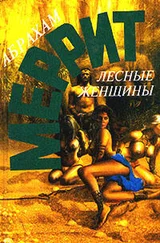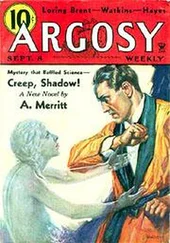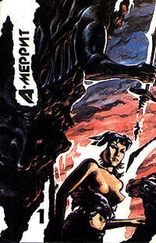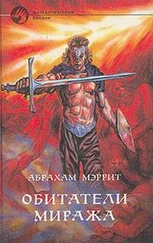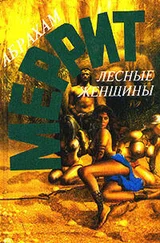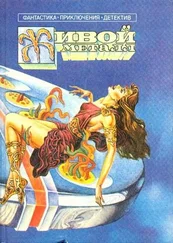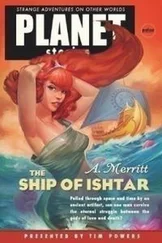Абрахам Меррит - Dwellers in the Mirage
Здесь есть возможность читать онлайн «Абрахам Меррит - Dwellers in the Mirage» весь текст электронной книги совершенно бесплатно (целиком полную версию без сокращений). В некоторых случаях можно слушать аудио, скачать через торрент в формате fb2 и присутствует краткое содержание. Год выпуска: 2017, Издательство: epubBooks Classics, Жанр: Фэнтези, на английском языке. Описание произведения, (предисловие) а так же отзывы посетителей доступны на портале библиотеки ЛибКат.
- Название:Dwellers in the Mirage
- Автор:
- Издательство:epubBooks Classics
- Жанр:
- Год:2017
- ISBN:нет данных
- Рейтинг книги:5 / 5. Голосов: 1
-
Избранное:Добавить в избранное
- Отзывы:
-
Ваша оценка:
- 100
- 1
- 2
- 3
- 4
- 5
Dwellers in the Mirage: краткое содержание, описание и аннотация
Предлагаем к чтению аннотацию, описание, краткое содержание или предисловие (зависит от того, что написал сам автор книги «Dwellers in the Mirage»). Если вы не нашли необходимую информацию о книге — напишите в комментариях, мы постараемся отыскать её.
Dwellers in the Mirage — читать онлайн бесплатно полную книгу (весь текст) целиком
Ниже представлен текст книги, разбитый по страницам. Система сохранения места последней прочитанной страницы, позволяет с удобством читать онлайн бесплатно книгу «Dwellers in the Mirage», без необходимости каждый раз заново искать на чём Вы остановились. Поставьте закладку, и сможете в любой момент перейти на страницу, на которой закончили чтение.
Интервал:
Закладка:
He chuckled.
"That morning we herded up a couple of hundred more of the tianusi and put them where the Little People think they'll do the most good. Then we started back—and here I am."
"Yes," I asked suspiciously. "And is that all?"
"All for to–night, anyway," he said. "I'm sleepy. I'm going to turn in. You go with Evalie and leave me strictly alone till to–morrow."
I left him to sleep, determined to find out in the morning what he was holding back; I didn't think it was entirely the journey and the leeches that accounted for his haggardness.
But in the morning I forgot all about it.
In the first place, when I awoke, Evalie was missing. I went over to the tent, looking for Jim. He was not there. The Little People had long since poured out of the cliffs, and were at work; they always worked in the morning—afternoons and nights they played and drummed and danced. They said Evalie and Tsantawu had gone into council with the elders. I went back to the tent.
In a little while Evalie and Jim came up. Evalie's face was white and her eyes were haunted. Also they were misty with tears. Also, she was madder than hell. Jim was doing his best to be cheerful.
"What's the matter?" I asked.
"You're due for a little trip," said Jim. "You've been wanting to see Nansur Bridge, haven't you?"
"Yes." I said.
"Well," said Jim. "That's where we're going. Better put on your travelling clothes and your boots. If the trail is anything like what I've just gone over, you'll need them. The Little People can slip through things—but we're built different."
I studied them, puzzled. Of course I'd wanted to see Nansur Bridge—but why should the fact we were to go there make them behave so oddly? I went to Evalie, and turned her face up to mine.
"You've been crying, Evalie. What's wrong?"
She shook her head, slipped out of my arms and into the lair. I followed her. She was bending over a coffer, taking yards and yards of veils out of it. I swung her away from it and lifted her until her eyes were level with mine.
"What's wrong, Evalie?"
A thought struck me. I lowered her to her feet.
"Who suggested going to Nansur Bridge?"
"The Little People…the elders…I fought against it…I don't want you to go…they say you must…"
"I must go?" The thought grew clearer. "Then you need not go—nor Tsantawu. Unless you choose?"
"Let them try to keep me from going with you." She stamped a foot furiously.
The thought was crystal clear, and I began to feel a bit irritated by the Little People. They were thorough to the point of annoyance. I now understood perfectly why I was to go to Nansur Bridge. The pygmies were not certain that their magic—including Evalie—had thoroughly taken. Therefore I was to look upon the home of the enemy—and be watched for my reactions. Well, that was fair enough, at that. Maybe the Witch–woman would be there. Maybe Tibur—Tibur who desired Evalie—Tibur who had laughed at me. Suddenly I was keen for going to Nansur Bridge. I began to put on my old clothes. As I was tying the high shoes, I glanced over at Evalie. She had coiled her hair and covered it with a cap; she had swathed her body from neck to knees in the veils and she was lacing high sandals that covered her feet and legs as completely as my boots did mine. She smiled faintly at my look of wonder.
"I do not like Tibur to look on me—not now!" she said.
I bent over her and took her in my arms. She set her lips to mine in a kiss that bruised them…When we came out, Jim and about fifty of the pygmies were waiting.
We struck diagonally across the plain away from the cliffs, heading north toward the river. We went over the slope, past one of the towers, and put feet on a narrow path like that which we had trod when coming into the land of the Little People. It wound through a precisely similar fern–brake. We went along it single file, and, perforce, in silence. We came out of it into a forest of close–growing, coniferous trees, through which the trail wound tortuously. We went through this for an hour or more, without once resting, the pygmies trotting along tirelessly. I looked at my watch. We had been going for four hours and had covered, I calculated, about twelve miles. There was no sign of bird or animal life.
Evalie seemed deep in thought and Jim had fallen into one of his fits of Indian taciturnity. I didn't feel much like talking. It was a silent journey; not even the golden pygmies chattered, as was their habit. We came to a sparkling spring, and drank. One of the dwarfs swung a small cylindrical drum in front of him and began to tap out some message. It was answered at length from far ahead by other tappings.
We swung into our way once more. The conifers began to thin. At our left and far below us I began to catch glimpses of the white river and of the dense forest on its opposite bank. The conifers ceased and we came out upon a rocky waste. Just ahead of us was an outthrust of cliff along whose base streamed the white river. The outthrust cut off our view of what lay beyond. Here the pygmies halted and sent another drum message. The answer was startlingly close. Then around the edge of the cliff, half–way up, spear tips glinted. A group of little warriors stood there, scrutinizing us. They signalled, and we marched forward, over the waste.
There was a broad road up the side of the cliff, wide enough for six horses abreast. We climbed it. We came to the top, and I looked on Nansur Bridge and towered Karak.
Once, thousands or hundreds of thousands of years ago, there had been a small mountain here, rising from the valley floor. Nanbu, the white river, had eaten it away—all except a vein of black adamantine rock.
Nanbu had fallen, fallen, steadily gnawing at the softer stone until at last it was spanned by a bridge that was like a rainbow of jet. That gigantic bow of black rock winged over the abyss with the curved flight of an arrow.
Its base, on each side, was a mesa—sculptured as Nansur had been from the original mount.
The mesa, at whose threshold I stood, was flat–topped. But on the opposite side of the river, thrusting up from the mesa–top, was a huge, quadrangular pile of the same black rock as the bow of Nansur. It looked less built from than cut out of that rock. It covered I judged about half a square mile. Towers and turrets both square and round sprang up from it. It was walled.
There was something about that immense ebon citadel that struck me with the same sense of fore–knowledge that I had felt when I had ridden into the ruins of the Gobi oasis. Also I thought it looked like that city of Dis which Dante glimpsed in Hades. And its antiquity hung over it like a sable garment.
Then I saw that Nansur was broken. Between the arch that winged from the side on which we stood and the arch that swept up and out from the side of the black citadel, there was a gap. It was as though a gigantic hammer had been swung down on the soaring bow, shattering it at its centre. I thought of Bifrost Bridge over which the Valkyries rode, bearing the souls of the warriors to Valhalla; and I thought it had been as great a blasphemy to have broken Nansur Bridge as it would have been to have broken Bifrost.
Around the citadel were other buildings, hundreds of them outside its walls—buildings of grey and brown stone, with gardens; they stretched over acres. And on each side of this city were fertile fields and flowering groves. There was a wide road stretching far, far away to cliffs shrouded in the green veils. I thought I saw the black mouth of a cavern at its end.
"Karak!" whispered Evalie. "And Nansur Bridge! And Oh, Leif, beloved…but my heart is heavy…so heavy!"
I hardly heard her, looking at Karak. Stealthy memories had begun to stir. I trod on them, and put my arm around Evalie. We went on, and now I saw why Karak had been built where it was, for on the far side the black citadel commanded both ends of the valley, and when Nansur had been unbroken, it had commanded this approach as well.
Читать дальшеИнтервал:
Закладка:
Похожие книги на «Dwellers in the Mirage»
Представляем Вашему вниманию похожие книги на «Dwellers in the Mirage» списком для выбора. Мы отобрали схожую по названию и смыслу литературу в надежде предоставить читателям больше вариантов отыскать новые, интересные, ещё непрочитанные произведения.
Обсуждение, отзывы о книге «Dwellers in the Mirage» и просто собственные мнения читателей. Оставьте ваши комментарии, напишите, что Вы думаете о произведении, его смысле или главных героях. Укажите что конкретно понравилось, а что нет, и почему Вы так считаете.
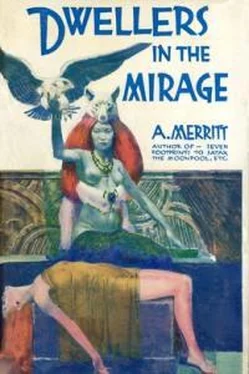
![Абрахам Меррит - Лунный бассейн [Лунная заводь]](/books/20623/abraham-merrit-lunnyj-bassejn-lunnaya-zavod-thumb.webp)
